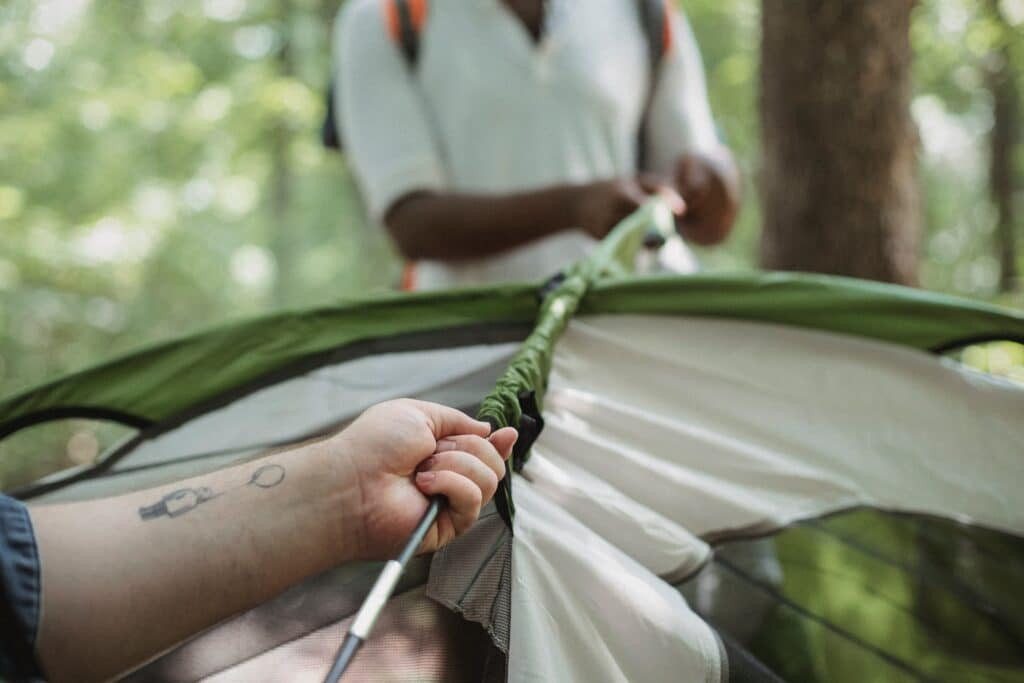UK Camping Guide
Choosing the perfect campsite
Choosing the perfect campsite in the UK can be exciting and sometimes slightly overwhelming. As a beginner, you have a few factors to consider – from the types of campsites to their locations and pitches, and the best times of the year to visit.
Here's a step-by-step guide to assist you in choosing a campsite.

Types of Campsites
There are different types of campsites available. These typically fall into three main categories:
- Commercial Campsites: These campsites often come with a variety of facilities such as showers, toilets, laundry services, and sometimes even a restaurant, bar or shop. They are perfect for beginners or families who prefer a bit more comfort during their outdoor experience.
- Farm Campsites: Located on active farmland, these campsites often provide basic amenities and allow you to experience the rustic charm of rural life.
- Wild Camping: For those seeking a more adventurous experience, wild camping involves pitching your tent on non-designated camping land, usually in remote locations. Although be aware, wild camping is only permitted in certain areas of the UK, such as Dartmoor and most of Scotland.
Location
Deciding on the best UK campsite locations to visit depends on your personal preferences and interests.
- If you enjoy hiking and mountain scenery, consider campsites in North West England such as The Lake District and Snowdonia.
- For stunning coastal views, try the Pembrokeshire Coast in Wales or South Cornwall in England.
- If you're a history buff, consider locations near historical sites like Stonehenge or Hadrian's Wall.
Remember, the UK is rich in national parks and areas of outstanding natural beauty, offering ample opportunity for memorable camping experiences.
Where to Pitch
Choosing the right place to pitch your tent is critical for a successful camping trip. Here are some key points to consider:

Pitch size
Check can the campsite accommodate your tent, caravan, or campervan? Is there enough space for your vehicle and any other camping gear you bring along?
Regulations
Make sure you're allowed to camp in the location you've chosen. Some areas have restrictions or require permits.
Ground Surface
Choose a flat and even area to pitch your tent. Look out for any rocks, branches, or uneven ground that could make sleeping uncomfortable. Avoid pitching your tent on a slope where you might be uncomfortable sleeping.
Trees
Be cautious when camping under trees. Falling branches can pose a hazard, and trees can also attract lightning during storms.
Wildlife
Be aware of signs of wildlife, such as tracks, droppings, or food sources. It's safer to pitch your tent a distance away from these signs.
When pitching your tent, consider the wind direction, sunlight exposure, and proximity to amenities. Maintain a good distance from other tents for privacy and noise control. Avoid pitching near toilets or bins to reduce noise and odour issues.
Time of Year
The time of year you choose to camp can significantly affect your experience. The most popular camping season in the UK is from Easter until September due to the warmer weather. However, each season has its own charm:
- Spring: Experience blooming flowers and milder temperatures.
- Summer: Enjoy long days, warm weather, and excellent hiking conditions.
- Autumn: Witness beautiful fall colours, fewer crowds, and cooler weather.
- Winter: For the brave-hearted, winter camping can be a serene experience, but be prepared for cold temperatures and shorter days.
See how to plan your camping trip for more information on UK campsite seasons.
Other Considerations
- Booking in advance: Popular campsites can get booked up quickly, especially during peak seasons. So it's a good idea to plan your trip and reserve your spot well in advance.
- Campsite rules: Each campsite will have its own set of rules regarding things like fire, noise levels, and waste disposal. Familiarise yourself with these rules to ensure a respectful and enjoyable camping experience.
- Reviews: Look at reviews from other campers. They can provide insights into the cleanliness of the site, how friendly and helpful the staff are, and whether the facilities are well-maintained.
Remember to plan ahead and consider what you and your group's needs and interests are to ensure you choose the best campsite for your holiday.
Camping is all about enjoying nature, so always follow the 'Leave No Trace' principles to preserve the environment for future generations. Happy camping!